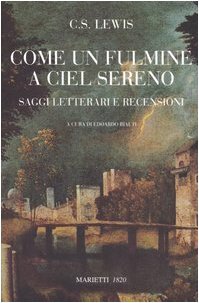- Bíblia
- Leia a Bíblia
- Versões da Bíblia
- Verso do dia
- Planos de Leitura
- Versos por Tópico
- Books of the Bible
- Imagens bíblicas
- Estude
- Comentários
- Concordâncias
- Dicionários
- Enciclopédias
- Sermões
- Bible Atlas & Maps
- BP Wiki
- Devocionais
- Devocionais de hoje
- Light of the World
- Todos os devocionais
- Inspirational Quotes
- Mais
- Picture Quotes
- Videos
- Inspirador
- Estudo da Bíblia
- O que a Bíblia diz
- Bible Q&As
- Daily Bread
- Bible by Genre
- Bible Stories
- Random Bible Verse
- Comunidade
- Store
Il volume raccoglie numerosi saggi sparsi, i più celebri, frutto di lezioni all'università, e articoli giornalistici: è possibile così cogliere la vastità degli interessi di Lewis, medievalista (i suoi scritti su Tasso e Dante sono editi in italiano da Marietti) e seicentista, ma anche recensore entusiasta delle opere dei suoi contemporanei, da Orwell a Tolkien, da C. Williams a D. Sayers. Il saggio su Tolkien e "Il signore degli Anelli" è tra i contributi critici più belli sul tema. Lewis riflette anche sui propri romanzi fantastici, descrivendone il processo di immaginazione e scrittura.
BUY NOW
Paperback, 222 pages
Published November 2005 by Marietti 1820
Se inscrever
© 2025 Bibleportal.com Todos os direitos reservados.

Clive Staples Lewis was born in Ireland, in Belfast on 29 November 1898. His mother was a devout Christian and made efforts to influence his beliefs. When she died in his early youth her influence waned and Lewis was subject to the musings and mutterings of his friends who were decidedly agnostic and atheistic. It would not be until later, in a moment of clear rationality that he first came to a belief in God and later became a Christian.
C. S. Lewis volunteered for the army in 1917 and was wounded in the trenches in World War I. After the war, he attended university at Oxford. Soon, he found himself on the faculty of Magdalen College where he taught Mediaeval and Renaissance English.
Throughout his academic career he wrote clearly on the topic of religion. His most famous works include the Screwtape Letters and the Chronicles of Narnia. The atmosphere at Oxford and Cambridge tended to skepticism. Lewis used this skepticism as a foil. He intelligently saw Christianity as a necessary fact that could be seen clearly in science.
"Surprised by Joy" is Lewis's autobiography chronicling his reluctant conversion from atheism to Christianity in 1931.
... Show more